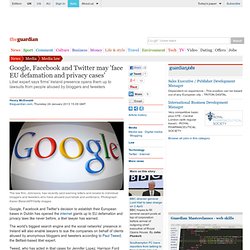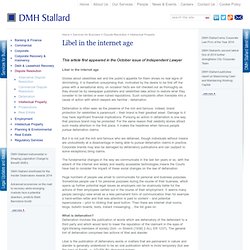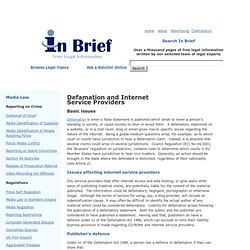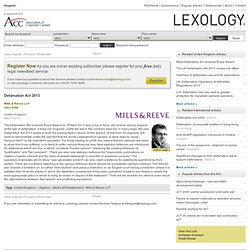

Media Litigation. Tort Law - Defamation flashcards. Flashcards Table on defamation exam.
Google, Facebook and Twitter may 'face EU defamation and privacy cases' The law firm, Johnsons, has recently sent warning letters and emails to individual bloggers and tweeters who have abused journalists and politicians.

Photograph: Karen Bleier/AFP/Getty Images Google, Facebook and Twitter's decision to establish their European bases in Dublin has opened the internet giants up to EU defamation and privacy laws like never before, a libel lawyer has warned. The world's biggest search engine and the social networks' presence in Ireland will also enable lawyers to sue the companies on behalf of clients abused by anonymous bloggers and tweeters according to Paul Tweed, the Belfast-based libel expert. Tweed, who has acted in libel cases for Jennifer Lopez, Harrison Ford and recently The X Factor judge Louis Walsh, who accepted damages €500,000 (£421,000) from the Sun, said it will be the likes of Google, Twitter and Facebook who will pay the ultimate price for the "abusive, anonymous blogger in his underpants". "Now the whole landscape has changed. Libel in the internet age - DMH Stallard (Solicitors) - London, Gatwick, Brighton. This article first appeared in the October issue of Independent Lawyer Libel in the internet age Stories about celebrities sell and the public’s appetite for them shows no real signs of diminishing.

It is therefore unsurprising that, motivated by the desire to be first off the press with a sensational story, on occasion facts are not checked out as thoroughly as they should be by newspaper publishers and celebrities take action to restore what they consider to be tainted or even ruined reputations. Such complaints often translate into a cause of action with which lawyers are familiar - defamation. Defamation is often seen as the preserve of the rich and famous. Indeed, brand protection for celebrities is paramount – their brand is their greatest asset.
But it is not just the rich and famous who are defamed, though individuals without means are undoubtedly at a disadvantage in being able to pursue defamation claims in practice. Regulatory Developments » Intermediary Liability.
Defamation and Internet Service Providers. Defamation is when a false statement is published which tends to lower a person’s standing in society, or cause society to shun or avoid them.

A defamatory statement on a website, or in a chat room, blog or email gives rise to specific issues regarding the nature of the internet. Being a global medium questions arise, for example, as to which court or courts have jurisdiction to hear a defamation claim. Indeed, it is possible that several claims could arise in several jurisdictions. Council Regulation (EC) No 44/2001, the ‘Brussels’ regulation on jurisdiction, contains rules to determine which courts in EU Member States have jurisdiction to hear civil matters. Google settles online abuse court case. Blogging, posting, linking… infringing? Not in Canada. Current UK case law tells us that posting excerpts from an article published online infringes copyright in that article.

Headlines are also protected, as they are deemed to form a substantial part of the article, and could in some cases be works in their own right (NLA v Meltwater, reported here and here). The Court of Appeal has confirmed that the exception permitting fair dealing for the purpose of reporting current events does not apply to this type of copying. The question of whether the temporary copies defence applies is being appealed to the Supreme Court (see here). Further, in a summary decision the UK courts have held that merely linking to a website that has published unlawful content could incur liability (McGrath v Dawkins). These issues form part of the current copyright consultation (a summary of the response is available here), but for the time being UK case law points firmly in favour of online copyright owners. The Federal Court of Canada dismissed both claims.
Defamation Act 2013. The Defamation Bill received Royal Assent on 25 April 2013 and, once in force, will amend various aspects of the law of defamation.

It does not, however, codify the law in this complex area but, in many ways, the new Defamation Act 2013 seeks to level the playing field in favour of free speech. A claimant, for example, will need to demonstrate under the new Act that the words complained of caused, or were likely to cause, "serious harm" to the claimant's reputation. For those trading for profit, this means that the claimant will need to show that it has suffered, or is likely to suffer, serious financial loss.
New statutory defences are introduced for statements which are true or which constitute "honest opinion", replacing the existing defences of "justification" and "fair comment". There are also new statutory defences for "responsible publications on matters of public interest" and for "peer-reviewed statements in scientific or academic journals. "